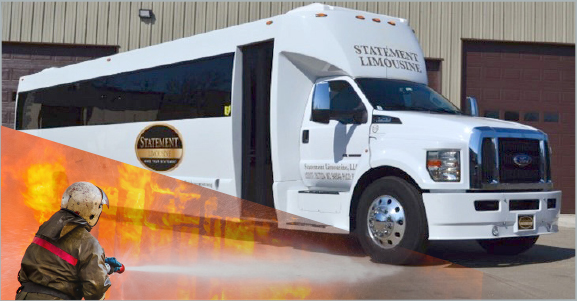BY KEN LUCCI
If any of you were a Boy or Girl Scout (or exposed to them through your kids or friends), you already know the motto “Be Prepared.” I thought of that as I started writing this article, so I went to verify the exact wording and found there is quite a bit to this motto beyond those two words that is appropriate in all facets of life and business.
 Consider that we’ve experienced major weather and natural events in just the past month—from the devastating fires in Hawaii to the horrendous storms of California and Florida. Of course, there are a million other unexpected situations that can pop up and derail your business, so would you be prepared to pick up at a moment’s notice? And, would you even know how to put everything back together once the crisis had passed?
Consider that we’ve experienced major weather and natural events in just the past month—from the devastating fires in Hawaii to the horrendous storms of California and Florida. Of course, there are a million other unexpected situations that can pop up and derail your business, so would you be prepared to pick up at a moment’s notice? And, would you even know how to put everything back together once the crisis had passed?
2019 was proving to be a banner year for Ohio-based Statement Limousine, a company founded in 2016 by Karl Guenther II. After years of working in his family’s environmental disposal business, Karl had managed to grow his own transportation company from a start-up with one limousine to a $1 million enterprise with a fleet of 12. He found success with stretch limousines and party buses with a focus on providing an exceptional customer experience serving private clients in the greater Cleveland area. The business had grown quickly primarily by word of mouth thanks to Karl’s tenacity and attention to detail.
After a typical busy Tuesday, Karl finally went to sleep after the long day, not realizing his life would change in just a few hours. Around 4:30 a.m. on July 10, 2019, he was awakened by his cellphone ringing, with the caller frantically asking him if he was OK. That was when he first learned that his business was no more.
Sometime during the night, a fire broke out at his building with most of his vehicles parked inside. The blaze was so intense that it took 39 firefighters from six communities working several hours to get it under control. Open flames and vehicles filled with gas proved to be an inferno that leveled the 15,000-square-foot metal garage and office building. When the smoke finally cleared, all that was left was one slightly heat-damaged limousine parked outside and a charred graveyard of vehicle skeletons under a pile of rubble that once was his facility.
As the gravity of the situation set in, Karl’s first thoughts were the hundreds of upcoming reservations on the books that were supposed to be fulfilled by his pristine fleet, which was nothing more than unrecognizable metal. So, he rallied his staff, and by working remotely with laptops and cellphones, they dealt with what seemed like an insurmountable task of getting all the jobs covered by other companies or notifying clients and refunding deposits.
Karl and his team called every limousine company they knew in the Cleveland area, and then expanded to affiliates throughout Ohio to make sure every trip was covered with a similar vehicle. Within 48 hours they had more than 100 jobs covered and only had to issue one refund to a nervous bride who decided to make her own arrangements. Karl credits his staff and his fellow operators for rolling up their sleeves and coming to his aid to help instead of just watching the business fail. It took a village, but they got it done.
 Photo courtesy of Statement Limousine
As the business limped along in the days after the blaze, Karl was faced with decisions most business owners never have to deal with. After all his existing reservations were rebooked with affiliates, he had to start rebuilding his company from a temporary location one vehicle at a time—or he knew he would not survive through the summer.
Photo courtesy of Statement Limousine
As the business limped along in the days after the blaze, Karl was faced with decisions most business owners never have to deal with. After all his existing reservations were rebooked with affiliates, he had to start rebuilding his company from a temporary location one vehicle at a time—or he knew he would not survive through the summer.
While the fire was devastating, the aftermath was even more challenging at times, proving that you can never be too prepared for a catastrophe. Along with securing other vehicles to handle existing reservations, he had to start the long process of rebuilding, which began with notifying his insurance companies (fleet and property) of the total losses and purchasing vehicles to replace those that were lost. He had to locate vehicle files, reassemble fleet data, and reconstruct the entire administrative and operations aspects of his business. It meant replacing everything from computers to pencils.
Within six months of the fire, Karl had purchased a new fleet (at considerably more out of pocket than he expected) and rebuilt his business to previous revenue levels, with plans for a new corporate headquarters. He survived the utter devastation and emerged resilient enough to handle his next challenge: a global pandemic.
If you ask Karl which was worse, the fire or COVID, he’ll answer without hesitation: the fire. Why? “Because at least with the pandemic we were all going through it together and learning together so we could share the experience,” he said.
 Flash forward to 2023 and Statement Limousine’s fleet is bigger than before the fire, and the company has settled into a brand-new corporate office/garage building. While the two defining moments in his company’s history begin to fade a little more into the background, the enduring lessons he learned stick with him forever.
Flash forward to 2023 and Statement Limousine’s fleet is bigger than before the fire, and the company has settled into a brand-new corporate office/garage building. While the two defining moments in his company’s history begin to fade a little more into the background, the enduring lessons he learned stick with him forever.
So, would you be able to handle a major business disruption like a flood, a vehicle accident, or the loss of a key employee? Or even a minor crisis like the loss of internet, power, or phones? You may never know what’s coming, but the good news is that you can plan for a lot while you have a clear head to avoid being put completely out of commission when an emergency strikes.
Building Your Emergency Preparedness Plan
- Create a disaster recovery and business continuity plan. In one document, detail staff, their positions, and job descriptions; all major processes; your vendors; customers and their information; assets (fleet to building to everything in between); and list the records you use for your business every day. Create a contingency plan that identifies how you would deal with the temporary or permanent loss of any or all of it. There is an entire section about this on a website devoted to preparation at ready.gov/business-continuity-plan. There are also resources your insurance company can provide. Use them because they will help you think about things you might forget to document or secure. Also consider talking to other operators who have been through catastrophic events. Their battle-tested advice will be invaluable.
- Maintain all business records offsite both on paper and electronically in the cloud. Include financial records, vehicle records, and DOT files. Make two copies of everything. Store one in a fireproof file cabinet and keep the other strictly offsite. Consider backing up everything electronically in the cloud instead of relying on your server. It may feel like overkill, but redundancy might just be a lifesaver.
- Stay liquid. Keep available capital reserves the equivalent of three to six months of business expenses available in case of an interruption of revenue or disaster.
- Build a community in your local area as well as outside your region. Maintain strong relationships with all operators in your area with similar fleets so you can call upon each other in an emergency. Also have a network of operators outside your immediate area who can help in a pinch in case the disaster impacts more than just you.
- Insure your building (regardless of whether you rent or own it) with an A-rated insurance carrier. Property insurance should cover the value of all business assets as “contents.” Detail everything with backup documents with the original cost: list computers, fixtures, and most importantly the purchase price or replacement value (whichever is higher) of your fleet. Vehicles should be listed on your commercial property insurance if you park them in the building or anywhere on the property. Keep this list updated and offsite in case of an emergency. Every time you add a vehicle, notify your property insurance carrier in addition to your commercial livery insurance.
- Consider a livery insurance policy that offers GAP coverage. It isn’t just for accidents where one of your vehicles is totaled. This insurance covers the difference in vehicle value between the total owed on vehicle loans and the current “stated value” of each vehicle on your vehicle policy. Check carefully to see what types of events are covered (arson, natural disaster, etc.).
- Consider business interruption insurance. While this was a sticking point for many during COVID when they found that it didn’t apply to a global pandemic, it can help replace the income you lose so you can pay bills if you can’t open temporarily after a covered loss, like property damage. This is also known as business income insurance and is contingent business interruption coverage.
“BE PREPARED”
Which means you are always in a state of readiness in mind and body to do your DUTY. Be Prepared in Mind by having disciplined yourself to be obedient to every order, and also by having thought out beforehand any accident or situation that might occur, so that you know the right thing to do at the right moment and are willing to do it. Be Prepared in Body by making yourself strong and active and able to do the right thing at the right moment and do it. “To do the right thing at the right moment.” Source: Scouting.org
Few of us were ready or could have predicted what was going to happen relating to a global pandemic, but hopefully all operators who made it through and remain in business have learned valuable lessons. With proper planning and preparation, business owners can be ready for other catastrophes that may befall us at any time that may seem like the worst days in our lives. Just ask the phoenix that has risen from the ashes in Ohio. [CD0923]
Ken Lucci is a consultant to the chauffeured transportation and hospitality industries. He can be reached at klucci@drivingyourincome.com.

